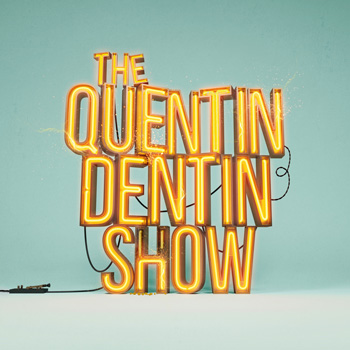Julian Eaves reviews the original London cast recording of The Quentin Dentin Show.
There is something particularly fitting about a show that is all about pop music to find it presented in album format. In fact, the theatrical productions of ‘Quentin Dentin’ (and there have been eight of them so far – reflecting the constant re-writing of the work by creator Henry Carpenter) have all, one way or another, felt more like live rock and roll gigs than stagings of a conventional ‘book’ musical. Indeed, most recently at the Tristan Bates Theatre, with a book re-fashioned by hip writer and performer Tom Crowley and in a production by Adam Lenson, this aspect came even more to the fore, with white boiler suited musicians dotted around the schematic suggestion of a domestic interior. It also happens that it is this version of the score that forms the basis of the cast album recording.
The magic new ingredient here is record producer (and co-founder of The Kooks) Paul Garred. Garred and Carpenter have a separate life working on at least one other major project and there is a high level of fidelity between the pair of them here. The record kicks things off with a grungy montage of radio background chatter, much in the manner of the 1970s ‘concept albums’ that are becoming all the rage again. Next, we go into a thudding Brit Pop synth-heavy title track, which sounds like a fairly conventional ‘I want’ song. Garred gives voices all the space they need, and we could cheerfully spend longer in their company, but most of the tracks are brief to the point of terseness. Similarly, in Carpenter’s writing, the lyrics – clever and well crafted, with an often stinging socio-political edge – tumble out thick and fast, so much so that one finds oneself longing for a chance to draw breath, to process everything one is hearing, and to digest the whole thing.
Still, the cheeriness of songs like ‘Lemons’ is a delight. In the title role, Luke Lane sings with exactness and respect for the notes and words; he’s fun, but possibly a little bit too well-behaved and clean-cut – I saw him on the stage as the Bastard in ‘King John’ at The Globe and I know he can be a great deal naughtier if he wants to be: and this character really seems to cry out for that. By contrast, as the girl, Shauna Riley’s beautifully measured Nat, with more experience in the the show, having survived multiple changes of script and scale and venue, makes an utter triumph of ‘Holiday’, a piece that was indeed written with her actual voice in mind. It’s real ‘hit’ material, but – again – perhaps it’s over before it really gets a chance to hook us and reel us in.
The same with ‘Friendzone’, which is a charming number, and so short. ‘(Making) People Like You’ – a song title that, if you preserve the gerund, contains multiple ingenious puns – fares better, with its close incorporation into the book. And then, the cold chill of ‘Too Weak To Refuse’ has a Bowie-like hypnotic beauty, and we’d gladly savour its moment just that little bit longer than we get here.
As things are, before we are allowed to become properly seduced by the music, we rapidly segue into ‘The Quentin Dentin TV Show’, another song with yet another strongly defined hook with a funky disco beat. The lyrics are just sublime, rhyming the title line (‘tee-VEE show’) with ‘In ev’ry language and credo’, which is a typical illustration of Carpenter’s artistry. What is interesting about this number, however, is that he hints at a journey for the title character, and that is something which – still – is largely absent from this entertainment. While the musical landscape of this show has been carefully cultivated, the dramaturgical shape of the show remains stubbornly elusive. However, I hear that further re-writes are in the offing.
But, when we get thumping rock’n’roll like that to be found in ‘The Blame Game’, do we really have to care so much? In some ways, this show currently works much better as an album than on the stage. ‘Life’, for instance, is an example of a number that can be shuffled to appear in a much earlier slot in the show: in fact, more than any other number, this is a great ‘scene setter’, and seems to be an opening number in all but location. Its universal message connects with an audience much more strongly than the particularity of the present curtain-raiser.
Equally, ‘Get Happy’ feels like it belongs to the exposition, telling us so much information about who Quentin is and enabling us to feel a tad closer to him, or at least to think we are. ‘Take Your Medicine’ (which I always think of as, ‘The Brain Machine’) brings us back into the speed of the closing narrative, propelling us into the story’s climax, and the central humanity-versus-mechanisation clash; it’s a nice thrashy stadium stomper, almost guaranteed to get the lucky people in the Stalls jumping and pogo-ing in wildly ecstatic sympathy. (Well, maybe.)
Interestingly, the much more English lyrical pop (The Kinks meets The Beatles… VERY Beatles!) ‘All Together Now’ might just get the same vertical reaction, arms extended and waving gently to left and right, hand-clappy a cappella’ish fade out. With a burst of canned applause. And a flick of the switch killer end.
It’s very rock and roll.

 The Quentin Dentin Show
The Quentin Dentin Show